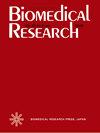墨丘子是一种新型的模型动物,适合于阐明日常嗜睡的机制。
IF 1.3
4区 医学
Q4 MEDICINE, RESEARCH & EXPERIMENTAL
引用次数: 0
摘要
昏睡是一种由于代谢率主动降低而导致体温降低的状态,具有潜在的医学价值。本研究的目的是建立一种无需施加复杂条件即可进入休眠状态的新型实验动物。当麝香鼩(Suncus murinus)保持在24°C的环境温度下时,大多数动物没有进入日常麻木状态。然而,当环境温度降至20℃以下时,在没有禁食和短日照的情况下,所有的鼩鼱都表现出迟钝。环境温度从24°C逐步降低到8°C的鼩鼱即使回到24°C的房间也会进入麻木状态。综上所述,本研究提示鼠足鼠可能是一种适合研究日沉机制的模型动物。利用该模型阐明冬眠的机制,可能有助于诱导包括人类在内的各种物种进入人工冬眠状态。本文章由计算机程序翻译,如有差异,请以英文原文为准。
Suncus murinus as a novel model animal that is suitable for elucidating the mechanism of daily torpor.
Torpor, a state of lowered body temperature due to active reduction of the metabolic rate, has potential medical benefits. The aim of this study was to establish a novel laboratory animal that enter torpor without imposing complex conditions. When house musk shrews (Suncus murinus) were kept at an ambient temperature of 24°C, most of the animals did not enter daily torpor. However, when the ambient temperature was lowered to below 20°C, all of the shrews showed torpor in the absence of fasting and short-day photoperiod. The shrews that were exposed to a stepwise decrease in ambient temperature from 24°C to 8°C entered torpor even after returning them to a room kept at 24°C. In conclusion, this study indicates that Suncus murinus may be a suitable model animal for elucidating the mechanism of daily torpor. Elucidation of the mechanisms of torpor by using this model may be useful for inducing a state of artificial hibernation in various species including humans.
求助全文
通过发布文献求助,成功后即可免费获取论文全文。
去求助
来源期刊

Biomedical Research-tokyo
医学-医学:研究与实验
CiteScore
2.40
自引率
0.00%
发文量
19
审稿时长
>12 weeks
期刊介绍:
Biomedical Research is peer-reviewed International Research Journal . It was first launched in 1990 as a biannual English Journal and later became triannual. From 2008 it is published in Jan-Apr/ May-Aug/ Sep-Dec..
 求助内容:
求助内容: 应助结果提醒方式:
应助结果提醒方式:


